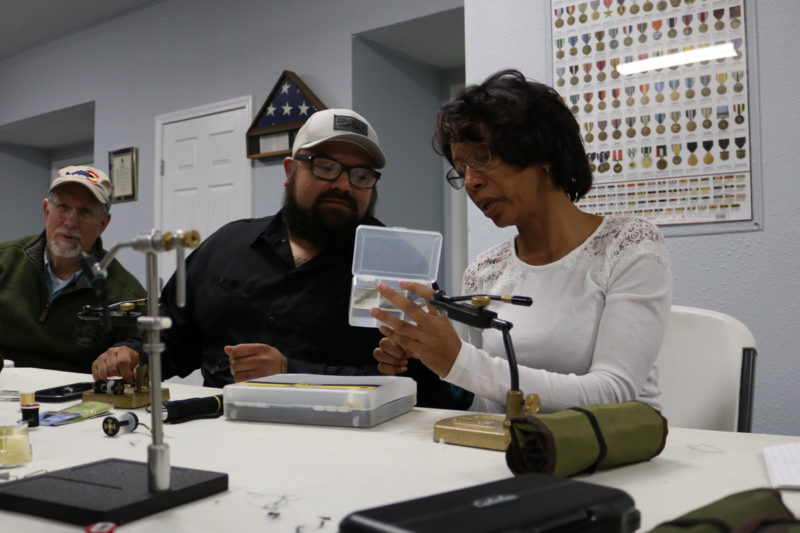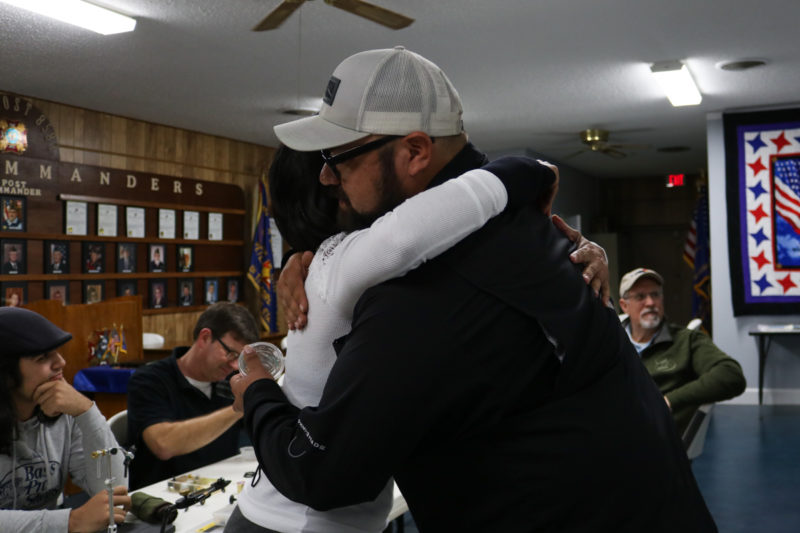New Groups Help Veterans Find Peace
By Christopher De Los Santos
Reporting Texas

Miguel Castro admires Jacqueline Taylor’s handmade fly ties at an event hosted by Project Healing Waters, an organization dedicated to the physical and emotional rehabilitation of disabled military service personnel and veterans. Eilish O’Sullivan/Reporting Texas.
GEORGETOWN — Jacqueline Taylor served more than 20 years in the Marines, and when she retired as first sergeant of an ordnance company, she felt on edge.
“I tried V.A. [Department of Veterans Affairs] counseling, but it didn’t help me — only 30 minutes, every other week, and the counselor looking at his watch the whole time,” said Taylor, who lives in Williamson County and declined to give her age. A VA psychiatrist wanted to prescribe her medication for her anxiety, but she didn’t want to become reliant on drugs.
Then she discovered an equine therapy program for veterans at the Ride On Center for Kids in Georgetown.
“The first time I really began to relax was with a mare called Belle,” Taylor said. “I didn’t even realize how tight I had been wound up inside until I started grooming Belle and learning to ride her.”
In a series of interviews in December, more than a dozen veterans who served in Iraq and Afghanistan told Reporting Texas that they were turning to new veterans organizations — rather than more established organizations such as the American Legion — to deal with traumatic experiences.
In the wake of the U.S. military’s extended involvement in Iraq and Afghanistan, veterans programs have sprung up in Central Texas that focus on equine therapy, fitness, community service and fly fishing.
Taylor’s story is fairly common, according to Kevin Bowers a Professional Association of Therapeutic Horsemanship International certified instructor. Bowers worked in California as an environmental engineer and then earned a graduate degree in psychology at University of Nebraska before finding his calling as co-coordinator of veterans programs at the Ride On Center.
“Nearly everyone has at least some PTSD,” Bowers said outside the horse training ring at the center. “It’s just a matter of how much and what caused it.”
“You have to get out of a clinical setting to see real effects,” Bowers said. “We see it with kids who need physical therapy and veterans who need emotional therapy. Progress in a clinical setting is slow, but when they begin working with a horse, they improve more quickly.”
During the therapy, the rider guides the horse one step at a time. Without trust between the rider and the animal, the horse won’t cooperate. Riders have to be sensitive to the horses they ride. Riders must be completely present in the moment while riding: completely attentive to the horse and the surroundings.
Without this complete attention to the riding experience, a rider won’t get cooperation from the horse. Achieving that kind of focus “allows the veteran to let go of feelings about past experiences, of worries of the future and, in that moment, find solace,” Bowers said. “What they do with a horse, they can apply in other areas of their lives — school, work, social relationships.”
In 2016, more than 20 million military veterans lived in the United States, according to the Department of Veterans Affairs. On average, more than 20 veterans of the recent conflicts in Iraq and Afghanistan commit suicide every day, according to the V.A.
Many veterans suffer from post-traumatic stress disorder from their combat experiences, said Michael Mault, who leads the Austin chapter of Team Red White and Blue, a veteran’s organization started in 2010.
When Mault and his wife, who is also a veteran, finished their Army service, they wanted to connect with fellow veterans with similar experiences.
“In 2008, we found the Veterans of Foreign Wars and American Legion still really focused on the surviving veterans of Korea and Vietnam. The shirts, jackets and caps they sold and the outreach events they held were really directed to veterans of those past wars,” Mault said.
Mault, 49, and his wife had young children at the time. They sought a healthy lifestyle, the outdoors and opportunities to serve fellow veterans and with fellow veterans to give back to their community.
The American Legion and Iraq and Afghanistan Veterans of America were too political, Mault said. “Veterans of Foreign Wars seemed too focused on their meeting hall with its bar, too focused on smoking, drinking, watching sports on television,” he added.
Team Red, White and Blue focused on fitness and being outdoors — activities such as hiking, running, walking, rafting and cycling— and proved to be exactly what the Maults, who live in Georgetown, needed.
“At least once per quarter, and really in Austin, once per month we have a community service activity to give back,” Mault said. “Sometimes we go to veterans’ homes around the area to visit with those older veterans of World War II and Korea. Lately, we have a two-mile stretch of road in Austin — the Adopt-a-Highway program — that we clean up and beautify.”
Mault’s chapter of Team RWB welcomes veterans and non-veterans — “veteran supporters, I like to call them,” he said.
Miguel Castro served in the Army between 2003 and 2010. Castro deployed to Iraq twice. “In Baghdad, in 2004 and 2005, my unit did a lot of raids. We saw a lot of combat. We kicked a lot of doors,” Castro said.
During his second deployment, from late 2006 through early 2008, Castro did more of the same at the beginning. Later his unit joined reconstruction and outreach efforts to help Iraqi civilians, he said.
To help deal with the combat trauma he experienced, in 2017 Castro joined Healing Waters — a national organization with a chapter in Georgetown – that teaches veterans how to fly fish. “Making flys and fly fishing is how I found my way home. And these last few months, I can teach others how to do what I do. For some, it helps them as much as it did me.”

Jacqueline Taylor and Miguel Castro embrace each other at the end of the fly tying event hosted by Project Healing Waters. Eilish O’Sullivan/Reporting Texas.
Castro, 33, left the Army in 2010 and lives in Georgetown. He said he tried to avoid dealing with his combat experiences until he found Healing Waters. “Now that I can teach others and help others, I feel important again. I have a purpose again – to help other soldiers find their own way home.”
Michelle Visel, a Georgetown real estate agent, is not a veteran, but she joined Project Healing Waters in 2013. She lived in Colorado at the time. “Project Healing Waters brought a small group of veterans to stay in my house and fish on my property,” Visel said. “We didn’t charge them for anything.”
When Visel moved to Georgetown in 2015, she continued to work with Healing Waters. “We teach veterans to cast, to catch a fish and also how to make their own fly lures. Then we take them on fly fishing trips around the western U.S.”
“Making the flys and then standing in the flowing water and fishing, they focus only on the present,” Visel said. “Whatever they saw or did or was done to them, they can let it go, for a little while.”
Like Castro, many veterans find fulfillment in helping others with their own recovery, Visel added.
“Teaching each other gives them a sense of teamwork and community,” she said. “Teamwork and community gives veterans a sense of purpose.”
Reporter Christopher De Los Santos is a U. S. Army veteran. He serves part time as a lieutenant colonel in the Texas Army National Guard.